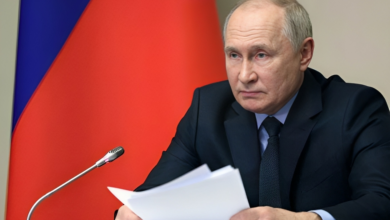Russian Oligarch Alexander Abramov Unsuccessful in Sanctions Appeal
Russian Tycoon Alexander Abramov Fails to Lift Sanctions: A Legal Battle Unravelled
The Russian oligarch Alexander Abramov, has recently found himself entangled in a legal dispute over sanctions imposed by the Australian government. Despite his efforts, the Federal Court upheld the Foreign Affairs Minister Penny Wong’s decision to reinstate sanctions against him in September 2022. These sanctions, initially enacted in response to the Ukraine invasion in April 2022, were imposed not only on Mr. Abramov but also on 66 other influential Russians. In this article, we delve into the details of this legal battle, examining the reasons behind the sanctions, the arguments put forth by Mr. Abramov’s legal team, and the implications of the Federal Court’s ruling.
Sanctions on Russian Oligarch Alexander Abramov

In the aftermath of the Ukraine invasion in April 2022, the Australian government, under the leadership of the prior administration, took a firm stance by imposing sanctions on several influential Russians, including Russian Oligarch Alexander Abramov. Mr. Abramov, who had previously served as the leader of Russia’s largest steel manufacturer, Evraz, was among those targeted by these sanctions. The primary objective of these measures was to apply diplomatic pressure on Russia in response to its actions in Ukraine.
Senator Wong’s Controversial Decision
However, the situation took a twist when Foreign Affairs Minister Penny Wong, in September 2022, made the decision to lift and then reinstate the sanctions on Mr. Abramov. This move raised eyebrows and triggered a legal battle, with Mr. Abramov seeking to have the sanctions lifted permanently. The crux of the matter revolved around whether Senator Wong had sufficient grounds to reclassify and reinstate Mr. Abramov’s status under the sanctions.
The Legal Battle Unfolds: Key Arguments

Russian Oligarch Abramov’s legal team vehemently contested the Australian government’s claims that he held economic or strategic importance for Russia. They pointed to his own statements about having no political ties and emphasised his decision to step down as chair of Evraz. The Australian government had argued that it seemed unlikely for an individual of Mr. Abramov’s stature, with an estimated net worth of $6.4 billion, to be completely disconnected from the Russian government.
The Minister’s Decision: Judicial Review
The heart of the legal battle centred on whether Senator Wong’s decision to reassert sanctions on Alexander Abramov was justifiable. The Federal Court was tasked with conducting a judicial review to determine whether there were any significant issues regarding the Minister’s decision. In essence, the court needed to assess whether Senator Wong had acted within her authority and with sufficient evidence to back her actions.
Federal Court’s Verdict: Upholding Sanctions

In a significant development, the Federal Court delivered its verdict on Friday. The court ruled in favor of the Australian government, affirming the decision made by Foreign Affairs Minister Penny Wong. The judgment declared that there were no significant issues regarding the Minister’s decision to reclassify and reassert Russian Oligarch Abramov’s status under the sanctions. This ruling had wide-ranging implications for both Mr. Abramov and the broader context of international sanctions.
Analysis and Implications:
The Federal Court’s decision to uphold the sanctions against Alexander Abramov carries several noteworthy implications. Firstly, it underscores the Australian government’s commitment to its foreign policy stance on Russia and its actions in Ukraine. By reaffirming the sanctions, Australia sends a strong message of condemnation and support for international efforts to address the crisis in Ukraine.
Secondly, this ruling raises questions about the role of wealthy individuals in geopolitics. Russian Oligarch Alexander Abramov’s case highlights the complexity of determining whether a person of significant wealth and influence can truly be disconnected from their home country’s government. The Australian government’s argument that Mr. Abramov’s stature and net worth made it improbable for him to have no ties to the Russian government challenges conventional notions of political influence and economic power.
Furthermore, this case may set a precedent for future legal battles concerning sanctions. It establishes the importance of evidence and the justification behind the decisions made by government officials when imposing or reinstating sanctions. The requirement for a judicial review ensures a level of accountability in such matters.
Conclusion:
The legal battle surrounding the sanctions against Russian Oligarch Alexander Abramov serves as a reminder of the intricate web of international politics, wealth, and influence. The Federal Court’s decision to uphold these sanctions reaffirms Australia’s commitment to its foreign policy objectives and sends a clear message to Russia regarding its actions in Ukraine.
Moreover, this case prompts us to reconsider the role of wealthy individuals in global affairs and the complexities of assessing their ties to their home countries. As international sanctions continue to be a tool of diplomatic pressure, the requirement for judicial reviews ensures transparency and accountability in the decision-making process. In the end, the outcome of this legal battle has broader implications for the world of diplomacy and international relations.







